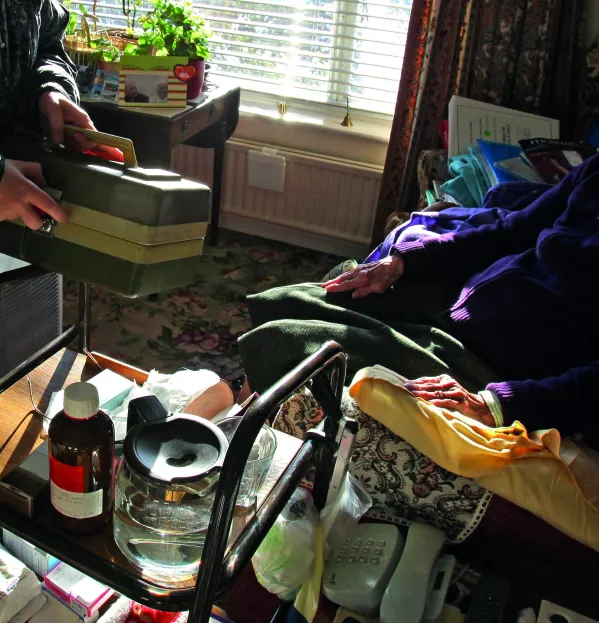What social distancing has taught us about social care

There are weeks when Samira is the only visitor George has to his small, sparse bungalow. Without her, he would not be able to live independently, but he would also have little human contact with the world outside his faded brown front door. For him, the interaction with another person is as crucial as the social care that Samira provides.
Even before the coronavirus crisis, people like George were becoming more numerous, and people like Samira were becoming harder to find: Age UK estimates that there are 1.5 million people in England alone who need some help with daily life but don’t receive it. With the lockdown measures and Covid-19 risks, it’s likely the situation will have worsened.
At Leeds City College, our health science and social care team have been doing their best to help mitigate that challenge, despite our campus being closed.
Our vocational courses range from entry level, providing introductory knowledge and skills, to level 3 learners progressing upwards towards higher education or into employment or apprenticeships. We help our students help others in areas as diverse as mental health to science of nutrition, from creative activities to infection control, to name but a few.
The abrupt closure of our campuses in mid March led to significant challenges to our ability to deliver these courses. Like all colleges, we had to take a long look at our provision and decide what was possible and what areas were a priority. It was clear that getting well-trained and efficient feet on the ground was our number-one task.
Rapid response
So how could we do that? We have partnered with our local authority in its heroic efforts to cope - rapidly increasing the speed at which it can help new social care workers be placed in the community, potentially within 10 to 20 days of starting on courses that it is delivering.
This began within days of the scale of outbreak being understood. We worked with our established contacts at the local authority to support their plans, sharing resources that we had created for its “Step into care” and “Bitesize” programmes to enable it to provide much-needed training to new staff.
Our role has also been to provide the necessary written assessments and feedback, ensuring that students are progressing through their courses as quickly as possible while adhering to the same high standards demanded when working in social care.
This collaborative approach to assessment and quality checks between our organisations mean that we are able to provide new local authority staff with a nationally recognised qualification: level 1 preparing to work in adult social care.
What’s really fantastic about this initiative is that students are employed from the first day. Then, once their training is completed, they become a key member of the workforce, providing a much-needed service.
Of course, while working on new initiatives is a vital part of the story, ensuring that existing learners are adequately catered for is also key. We have used virtual meeting software to team teach and have received very positive feedback from trainees. While the meetings have presented some difficulties for those learners who do not have good IT skills, we have coached them through their difficulties with telephone video calling to show them how to access the groups, along with one-to-one meetings and small-group phone conversations. This will ensure a continued stream of trained care workers into the system in the long-term - there will have been no shortfall due to a lack of teaching.
An essential profession
And yet, both the short- and long-term efforts we have introduced may not be enough. Many of our students are adults returning to study while they are employed to improve their qualifications and progress professionally. While it is always pleasing to see adult learners taking on new skills, the need for more social care workers across the country means that encouraging adult learners into the sector must be given more focus - we need more people of all ages coming into the sector.
To do that, we need to make social care more attractive. Part of that is perception - we need a national advertising campaign to showcase the vital work done in the sector and how rewarding it can be. But we also need a change in salary and professional responsibilities so these roles are held in higher regard.
Because these are essential, professional jobs. Staff need to be highly trained and skilled to support people of all ages through some of the most challenging times of their lives. If this crisis has taught us anything, it is that we should reassess the meaning of the phrase “key worker”.
Louise Rook is head of health science and social care; Frances Gouldsborough is deputy head of health science and social care; and Estelle Brewster is deputy head of health and care apprenticeships at Leeds City College’s Quarry Hill Campus, which forms part of Luminate Education Group
This article originally appeared in the 22 May 2020 issue under the headline “Why government can’t distance itself from our social care emergency”
You need a Tes subscription to read this article
Subscribe now to read this article and get other subscriber-only content:
- Unlimited access to all Tes magazine content
- Exclusive subscriber-only stories
- Award-winning email newsletters
Already a subscriber? Log in
You need a subscription to read this article
Subscribe now to read this article and get other subscriber-only content, including:
- Unlimited access to all Tes magazine content
- Exclusive subscriber-only stories
- Award-winning email newsletters